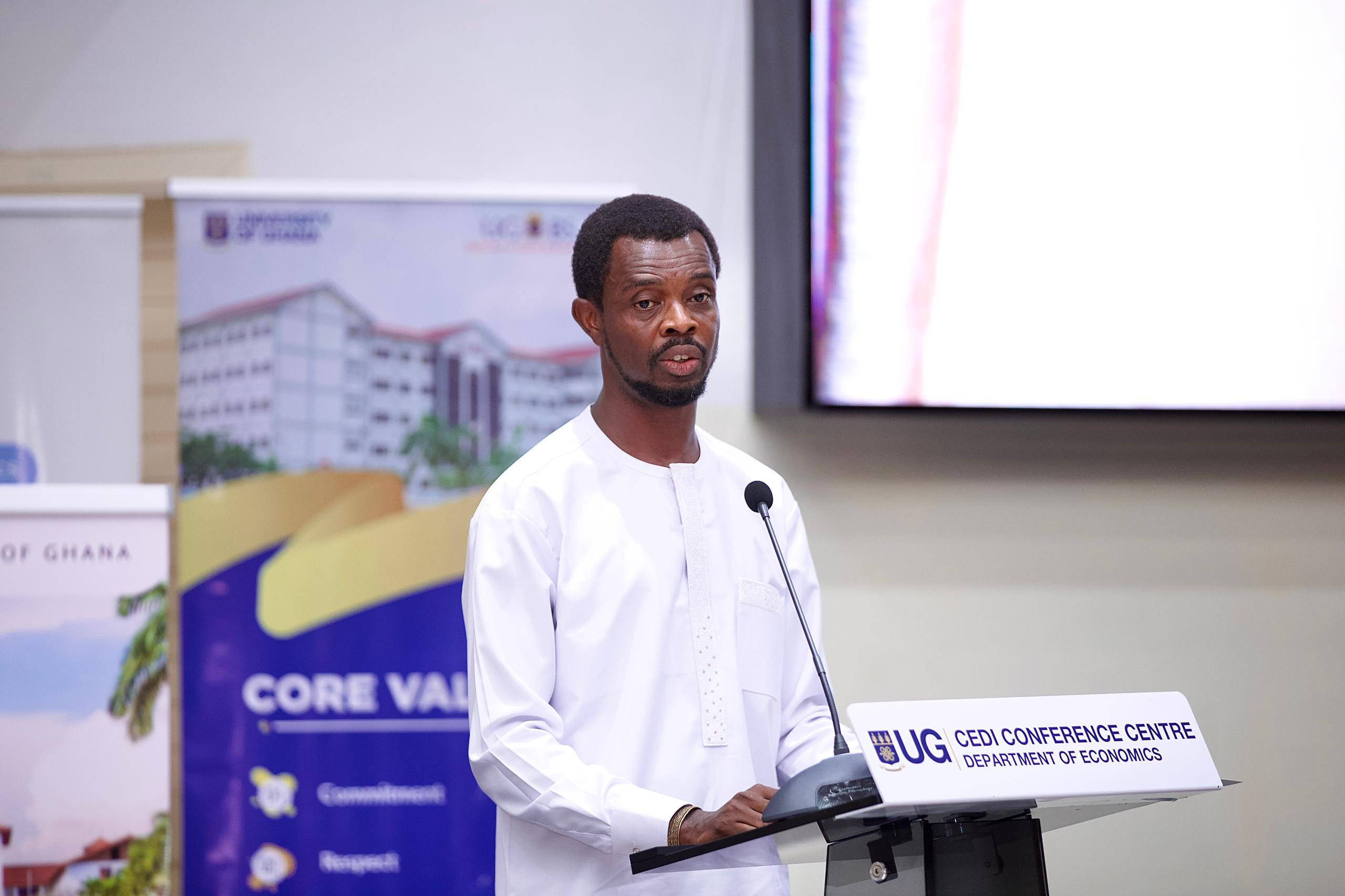
UG–Bank of Ghana Chair in Finance and Economics Delivers Guest Lecture on Monetary Sovereignty
The University of Ghana Business School (UGBS), in collaboration with the Department of Economics and the Bank of Ghana, hosted a public guest lecture by Prof. Yegandi Imhotep Paul Alagidede, the UG–Bank of Ghana Chair in Finance and Economics, on 5th August 2025, at the Cedi Conference Centre. The theme for the lecture was “From Cowries to Crypto: The Long Arc of Monetary Policy in Africa.” The lecture was chaired by Prof. Nana Aba Appiah Amfo, Vice-Chancellor of the University of Ghana, and attended by key dignitaries, including Dr. Johnson Pandit Asiama, Governor of the Bank of Ghana, who served as the Special Guest of Honour.
In his lecture, Prof. Alagidede traced the evolution of Africa’s monetary systems from pre-colonial times to the current fiat-dominated era. He employed poetic prose and empirical data to critique the continent's over-reliance on foreign monetary models and the consequences of inflation targeting frameworks that neglect local realities. He described how indigenous currencies such as cowries, gold dust, and iron blades once formed the foundation of an economic system deeply rooted in social trust, communal values, and labour. “A cowrie’s worth,” he stated, “reflected the perilous journeys across deserts; a blade, the fire-forged skill of a blacksmith.” These currencies, he noted, symbolised value created from land and labour, not from speculative financial engineering.
Prof. Alagidede criticised the onset of colonial rule and modern economic orthodoxy, Africa’s organic financial systems, which were replaced with fiat currency and foreign monetary doctrines. He named it the "tyranny of fiat," where money is created not through productivity but by decree. He described how this system has led to inflation, currency depreciation, and overwhelming debt across the continent. The lecture was not only philosophical, but also empirically grounded. He presented data to show the structural failures of Africa’s inflation-targeting regimes, which, he argued, are often based on Western templates unsuited to African economic realities. He revealed how monetary tightening, the typical response to inflation, often ends up starving productive sectors, especially SMEs and agriculture, of much-needed credit.
To address these challenges, Prof. Alagidede proposed a paradigm shift: a new monetary architecture rooted in Africa’s resources, labelled “Resource-Based Monetary Sovereignty (RBMS)”. In this system, the money supply would be anchored to real, verifiable productive assets such as gold, cocoa, solar energy, and land, rather than interest rate tools or foreign capital flows. He presented a model known as the “Endogenous Resource-Backed Currency (ERBC)”, designed to grow liquidity in line with domestic productivity. This would reduce reliance on imported inflation and external financial systems, enabling African countries to build wealth based on their natural and human capital.

A standout highlight of the lecture was Nabiya Qapital (₦aQ), which is a practical pilot of the RBMS–ERBC system already underway in Ghana’s Bono and Northern Savannah regions. The initiative uses blockchain technology through a platform developed by Gnostic Agritech to tokenise farm produce. He noted that the initiative has led to a 30% reduction in inflation volatility and a 200% increase in SME access to credit, especially for youth-led agribusinesses and solar ventures.
Prof. Alagidede called on policymakers, central banks, and academic institutions to support this shift by amending the Bank of Ghana Act to enable developmental mandates and resource-backed lending, launching the Digital Cedi (dCedi), a fully resource-backed central bank digital currency using gold, cocoa, and other verified assets and establish a Cedi Research Unit and an Institute for Metanomic Futures at the University of Ghana to champion research in indigenous and futuristic economic models.
He concluded with a visionary call: “Let every currency be a covenant, not of debt, but of destiny.” He urged the continent to reconnect value with what truly builds wealth, land, labour, and love, and to reclaim the arc of African monetary wisdom from cowries to crypto. The lecture sparked vibrant discussions on the future of African finance, positioning the University of Ghana and the Bank of Ghana as leaders in shaping alternative, sustainable economic futures for the continent.
In his remarks, Dr. Johnson Pandit Asiama, Governor of the Bank of Ghana, expressed appreciation for Prof. Alagidede’s groundbreaking lecture and affirmed the Bank’s interest in innovative approaches to monetary policy, particularly those rooted in local realities. Prof. Nana Aba Appiah Amfo, reiterated the University’s commitment to supporting cutting-edge research that informs policy and transforms society. She noted that the UG–Bank of Ghana Chair has proven to be a valuable catalyst for meaningful conversations on economic sovereignty and innovation.